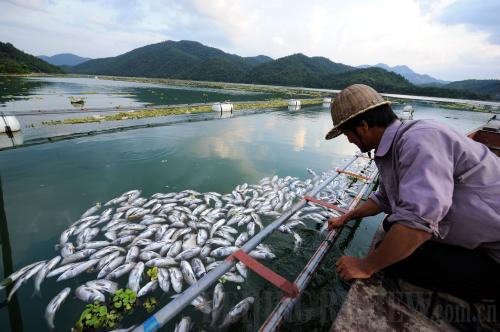|
 |
|
SEWAGE TOLLS: A fish farmer in Yongding County, Fujian Province, observes dead fish floating on Tingjiang River on July 13. They were killed by the contamination of an acidic spill from a mine belonging to the Zijin Mining Group (JIANG KEHONG) |
Zijin Mining Group Co., China's largest gold producer and a public company, is struggling to find its way out of a credibility crisis caused by a belatedly revealed leak of mine sewage that polluted a major river. The spill, containing acidic copper from a smelter in Longyan City, Fujian Province, killed fish, fouled drinking water and drew cries for compensation from the neighboring Guangdong Province.
Almost one month after the spill on July 3, the profitable gold and copper mining company with ambitions to expand abroad is still haunted by its long-term environmental record and unusually close ties to the local government.
Environmental disaster
The contaminated river is the 285-km-long Tingjiang River, which flows through four Fujian counties before running into nearby Guangdong. The waterway provides drinking water for residents living along its shores and is vital to the livelihood of thousands of aquatic farmers.
During the nine days after the leak, in one reservoir on the Tingjiang River alone, at least 1,890 tons of farmed fish were poisoned or killed. Given the pubic health emergency, the Shanghang County Government has stepped in. It said on July 12 that it has purchased all the farmed fish at 6 yuan ($0.88) per kg, released live fish into the wild and conducted landfill disposal of the dead fish, so that polluted fish won't be eaten.
On July 15, the Government of Guangdong's Dapu County, which is at the lower reaches of the Tingjiang River, stopped all fishing in the Tingjiang River amid health concerns. Three days later, the Dapu County Government asked aquatic farms to release all farmed fish, totaling 450 tons, into the wild due to poison concerns. The Longyan City Government has promised to compensate farmers for their losses.
"Although copper is not a top heavy-metal pollutant, like lead and mercury, excessive copper in the body can damage the liver and gallbladder, as well as the brain," Wang Shengrui, a researcher with the State Environmental Protection Key Laboratory for Lake Pollution Control, told China Daily.
Copper, he explained, becomes attached to the body of fish and shellfish, which contaminates the food chain, and settles into mud and sand in the riverbed.
The pollution is also irreversible. Unlike chemical compounds which can decompose or be diluted, once heavy metals are released into water or on land, they are difficult to extract and will have a long-term impact on the area, he added.
A joint investigation conducted by the Fujian provincial and Longyan city environmental protection authorities said the wastewater leak had occurred among a number of the plant's tanks, including one sewage tank, due to poor maintenance.
The investigation found persistent heavy rains in previous weeks caused the impermeable seal of the sewage tank to burst, releasing a large quantity of wastewater.
The investigation showed altogether 9,100 cubic meters spewed from the blown-out sewage tank and flowed through an "illegally built passage" into the Tingjiang River between 4 p.m. July 3 and 2:30 p.m. July 4.
The investigation also found the passage was dug through the impermeable wall of the surveillance tank, which sits next to the sewage tank and had been built to monitor and collect wastewater leaked from the sewage tank, and this passage was actually connected to an outfall used to drain flood water.
The investigation further showed the plant failed to improve the sewage system, as ordered by the provincial environmental protection authorities as early as September 2009 when they found the plant had discharged excess wastewater into the river.
The investigators said the company and local environmental protection authorities failed to promptly detect the pollution because the water quality monitoring facilities set up in the lower reaches of the Tingjiang River were damaged.
The plant, which produces about 40 tons of copper a day, has been ordered to suspend production and improve anti-leakage measures for all its tanks, as well as launch an investigation to see whether shallow ground water has also been contaminated.
A new leak occurred on July 16, when 500 cubic meters of plant waste was discharged into the Tingjiang River.
Following the worst pollution accident in the company's history, several executives of the copper plant have been detained and local governments have asked officials held accountable for the accident to step down.
On July 15, a press conference held by the Public Security Bureau of Shanghang County announced that Lin Wenxian and Wang Yong, head and deputy head of the plant, as well as Liu Shengyuan, who was put in charge of the plant's environmental protection, had been detained by the local police. The company's vice president, Chen Jiahong was detained on July 27.
On the same day, Chen Jun'an, head of the county's environmental protection bureau, resigned.
The local authorities also announced on July 16 that Qiu Heqing, head of Shanghang County, had been suspended from his post. Lan Fuyan, deputy head of the county, and Lin Lianjin, director of Longyan City's environmental protection bureau, were fired.
Chronic violator
Many media organizations conducting investigative reports in Shanghang County said that local people have deemed faucet water too unsafe to drink for years. Instead, they have been buying bottled spring water or purified water for drinking and cooking.
| 